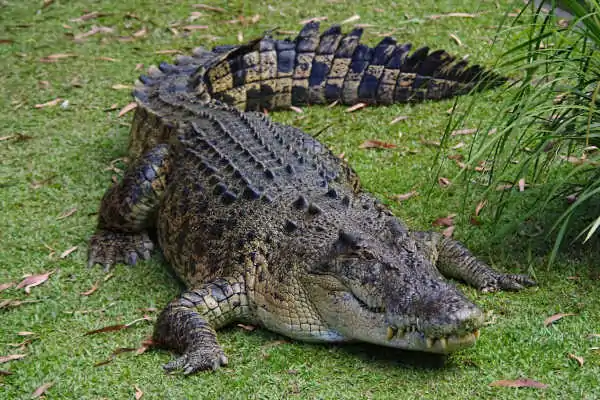When people think of crocodiles, they may initially wonder if these creatures are classified as fish due to their aquatic lifestyle and semi-aquatic behavior. However, despite their frequent presence in water, crocodiles are not fish. In this article, we’ll delve into the biological classification of crocodiles, compare them to fish, and clarify the differences between these two types of animals.

Crocodiles belong to the reptile class, specifically the Crocodylia order. This group includes species like alligators, caimans, and gharials. Crocodiles are large, carnivorous reptiles that live in rivers, lakes, and marshlands, and are known for their distinctive long bodies, powerful jaws, and armored skin. Their biological traits set them apart from fish in several key ways:
Respiratory System: Crocodiles, like other reptiles, have lungs and breathe air. This is a key characteristic that differentiates them from fish, which typically rely on gills to extract oxygen from water.
Reproduction: Crocodiles lay eggs, which is another hallmark of reptiles. Fish, on the other hand, generally reproduce by laying eggs in water or by live birth in some species, but their reproductive methods are quite different from reptiles.
Body Temperature: Crocodiles are cold-blooded, meaning their body temperature fluctuates with the environment. Fish, however, can be either cold-blooded or warm-blooded depending on the species.
While crocodiles and fish share a habitat in water and may appear similar in certain respects, they have vastly different physiological characteristics. Here are some of the major differences:
Crocodiles are primarily terrestrial reptiles that spend a significant amount of time in freshwater or brackish water environments. However, they are capable of moving between land and water and can spend several hours basking in the sun to regulate their body temperature.
Fish, on the other hand, are typically aquatic animals that live their entire lives submerged in water. Fish are specifically adapted to life underwater, with gills for breathing and fins for movement.
Crocodiles have four strong limbs, a muscular tail, and a specialized heart that supports life both on land and in water. They also have a tough, scaly body that helps protect them from predators and extreme environments.
Fish generally have fins, scales, and gills for swimming and breathing underwater. The absence of lungs makes it impossible for fish to live on land.
Crocodiles are apex predators, feeding on a wide range of prey, from fish and birds to mammals. Their powerful jaws and sharp teeth allow them to hunt efficiently in both aquatic and terrestrial environments.
Fish, depending on the species, may eat algae, plankton, smaller fish, or in some cases, larger animals. Their feeding methods, adapted to an aquatic environment, are quite different from the predatory nature of crocodiles.
Despite spending much of their time in water, crocodiles are clearly not fish due to fundamental differences in their biology and behavior. Let’s examine why:
Classification: Crocodiles are classified as reptiles, not fish. The kingdom Animalia is divided into various phyla, and reptiles, including crocodiles, belong to the class Reptilia, while fish are part of the class Pisces.
Evolutionary Background: Crocodiles evolved from land-dwelling reptiles more than 200 million years ago. Their ancestors were terrestrial reptiles, and while they adapted to aquatic environments, their evolutionary history is rooted on land, unlike fish, which evolved entirely in water.
Respiration: One of the main distinctions between crocodiles and fish is their respiratory system. Crocodiles have lungs and breathe air through nostrils, while fish use gills to extract oxygen from water. This difference highlights the contrast between these two species.
Reproduction: Crocodiles reproduce by laying eggs on land, a characteristic typical of reptiles. Fish, however, reproduce in water, and their reproductive methods, such as external fertilization, are different from those of reptiles.
While crocodiles are highly adapted to living in aquatic environments, they are not fully aquatic like fish. Crocodiles can swim efficiently and hunt in the water, but they are not capable of living exclusively underwater. They need to surface regularly for air and often come ashore to bask in the sun or lay eggs. In contrast, fish are perfectly adapted to life in water and do not need to leave the water to breathe or reproduce.
Crocodiles are typically found in rivers, lakes, and marshes, where they can hunt and find shelter. They can live in both freshwater and saltwater habitats, depending on the species. However, they need to come to the surface for air, as their lungs do not allow them to extract oxygen from water like fish can.
Fish are exclusively aquatic creatures, fully adapted to living in water throughout their entire life cycle. With their gills for breathing and fins for swimming, fish are designed to thrive in aquatic environments, which sets them apart from crocodiles.
In conclusion, while crocodiles may live in aquatic environments and share certain similarities with fish, they are reptiles, not fish. Their biology, respiration, and evolutionary history clearly separate them from fish. Crocodiles are air-breathing, cold-blooded reptiles that can thrive both in water and on land, while fish are entirely aquatic creatures with different physiological adaptations.
By understanding these key differences, it becomes clear that crocodiles belong to the reptile class, whereas fish are an entirely separate group of aquatic animals. Whether you're fascinated by crocodiles' unique adaptations or curious about their role in the ecosystem, it's important to recognize the fundamental differences that make them distinct from fish.
What Makes Crocodiles Different from Alligators: A Detailed Comparison
The Life Cycle of Crocodiles: From Eggs to Adult Predators
How Crocodiles Adapt to Both Land and Water Environments
animal tags: Crocodylidae
We created this article in conjunction with AI technology, then made sure it was fact-checked and edited by a Animals Top editor.